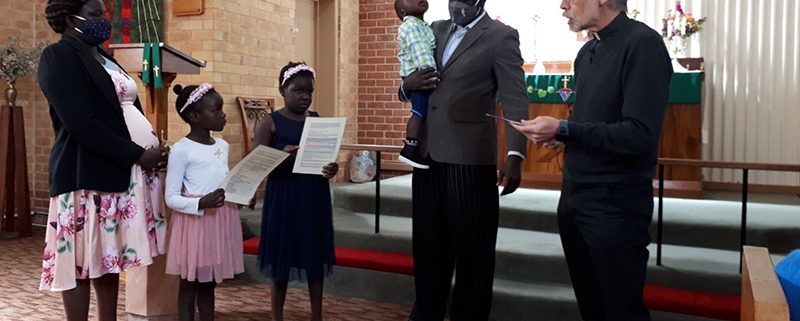by Lisa McIntosh
The COVID-19 pandemic has so dominated the lives of many Australians and New Zealanders at home for the past 18 months that it’s been easy to forget that around the world people are suffering who need our prayers.
But Peter Gerang Deng has not forgotten the troubles and tragedies of his homeland of South Sudan in north-eastern Africa. South Sudan is a diverse nation of more than 60 major ethnic groups, which has long been wracked by civil wars, violence, political instability and natural disasters, which have displaced millions of people and left many others living in poverty. Peter, who like his wife Rebecca Manyang is from South Sudan’s Denka ethnic group, is an educator and an elder at Immanuel Lutheran Church in North Adelaide. The couple has three children, who have all been born in Australia, and is expecting a fourth child.
Concerned that local people were no longer aware of needs beyond their own restrictions and borders, Peter raised the issue with Immanuel’s pastor, Rev Dr Mark Worthing. ‘He said, “Pastor, can we do something to encourage people to pray for South Sudan? With everything else going on in the last year, people have forgotten the needs there’, Pastor Mark explains.
‘So, the next week Peter made a presentation to the congregation about the needs in South Sudan. Afterwards, people said we should do more to focus on this. Someone else said it would be nice to get families involved and make it an intergenerational effort. That’s how the “November Family Prayer Challenge”, with its focus on South Sudan, came about.’
With the backing of the congregation’s Grow Team, Peter and Pastor Mark launched the month-long prayer challenge on 24 October, giving out laminated guides so that members, along with their families and friends, were ready to start the innovative program the following Sunday. The guides were also sent out via email and are available on the congregation’s website (www.immanuelnorthadelaide.org.au under ‘News and Resources’, ‘Other Resources’).
While prayer was pivotal to the program, there were three key elements of the challenge each week for four weeks for those taking part – learn, pray, act.
‘We wanted to encourage everyone to learn more about the current situation and needs in South Sudan, to pray for its people, and to explore ways to concretely help the situation there’, Pastor Mark says. ‘We also wanted to encourage people to do this as families, or with a friend or group of friends, either within or outside of our congregation.’
Each week a distinct focus was identified, built around the principles of learning, praying and doing.
‘It is important that we inform ourselves if we are to better pray for others. And when we pray for others, we need to ask whether there are ways in which God might use us to help with the needs for which we are praying.’
One or two concrete activities were suggested each week of the program that fit the learning and praying theme for that week. Families and individuals were also invited to share their experiences in worship from the previous week.
The prayer challenge linked in with Australian Lutheran World Service, which supports aid and development projects in South Sudan, and which provided Immanuel with a guest speaker to help raise awareness about its ongoing work and partnerships in Africa.
Peter, who became a teacher through Lutheran World Federation at Kakuma refugee camp in Kenya, where he met Rebecca, said the prayer challenge was helping to raise awareness locally of the ‘chaotic’ situation in South Sudan, even though the country was technically in ‘peacetime’ after multiple civil wars.
He says when people have a greater awareness of a situation, they then can pray and understand how best to do something to support people in need. ‘[We have a saying that] if you want to help somebody, don’t give them a fish, give them a hook or a net to go and feed themselves’, he says. ‘Give them something to do beyond war.
‘Despite having no war now, there’s something called negative and positive peace. There may be peace there – no guns going throughout the country – but there are pockets of instability going on.
‘I often speak to elders at North Adelaide who came from Germany after World War II. They share their stories of when they arrived here. They think they are no longer refugees but when people talk about refugees and what they face, it’s something they can relate to easily. Now they have a better picture of the people of South Sudan.’




